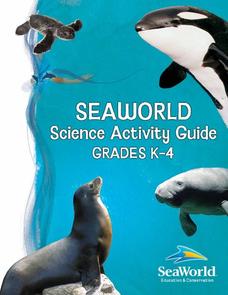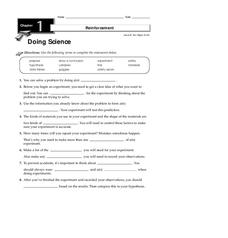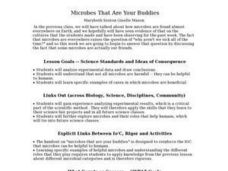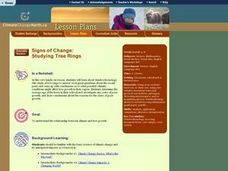Chymist
Landfills and Recycling
Examine the nature of landfills through experimentation. Scholars build miniature landfills and monitor changes over a six-week period. Observations allow individuals to draw conclusions about the different types of trash and their...
Kenan Fellows
Sensors in Chemistry
The Environmental Protection Agency monitors sensors to track air pollution and set clean air standards. Enthusiastic young scientists use similar sensors to gather data in their area and then apply the gas laws and conservation of...
Curated OER
Parachute Drop
Learners will have fun creating a parachute to collect data with. They will construct the parachute in small groups, measure the materials, and create an observation sheet. Then they drop the parachute and make predictions about how long...
Curated OER
Recognizing Litter
When does trash become litter? Use this litter awareness lesson to help them understand the importance of trash disposal. Get learners engaged by reading Nancy Loewen's Lady Lulu Liked to Litter (not included). After discussing what...
Frederick Moleski, Ph.D.
Blood Spatter: Bloodstain Analysis Experiments
It may be gruesome but somebody's got to do it! Young forensic scientists get a feel for what the job entails as they study blood spatter in seven experimental activites. They examine how spatter can be changed by release height,...
Tennessee Valley Authority
Renewable Energy Sources
Not all energy sources are renewable, as learners investigate in this unit. Made up of six lessons that span a few weeks of instruction, the unit has learners examining US energy reserves and consumption, using data to draw conclusions...
Las Cumbres Observatory
Astronaut Training: Dexterity
How do astronauts do anything with those gloves on? Learners mimic what astronauts need to overcome as they complete puzzles while wearing multiple gloves. They time themselves and use the information to draw conclusions about the...
Sea World
Seaworld Science Activity
A fun collection of activities about marine life would be a great addition to your elementary science unit. From cute penguins to scary sharks, the unit features crafts, experiments, and basic research projects that will teach your...
Howard Hughes Medical Institute
Got Lactase? Blood Glucose Data Analysis
Many physicals include a blood glucose test, but what are doctors actually testing? Scholars graph and interpret blood glucose data, allowing them to observe the differences in lactase persistence and draw conclusions. They then connect...
Purdue University
The Case of the Pilfered Pin: A Measurement Inquiry Activity
Who pilfered the pin? Scholars practice measurement skills as they solve the mystery of a stolen pin. They measure length, temperature, and mass and determine which of select suspects committed the crime. During the STEM hands-on...
Las Cumbres Observatory
Plotting an Asteroid Light Curve
Data can tell us a lot about celestial objects that are just too far away to study otherwise. Learners examine data on the brightness of an asteroid to predict its rotation rate. Graphing the data reveals a periodic pattern that allows...
Curated OER
Archaeological Inquiry
Students describe what they see as they observe an "artifact". They draw conclusions based on the information gathered to identify what the artifact might be used for and determine how old it might be.
Curated OER
Doing Science
In this science experiment process activity, students will learn about the steps of conducting a science experiment, including creating a hypothesis, collecting data and drawing a conclusion. This activity has 8 fill in the blank...
Curated OER
Microbes That Are Your Buddies - Biology Teaching Thesis
Students analyze experimental data and draw conclusions. They are able to comprehend that not all microbes are harmful--they can be helpful to humans. Students are able to comprehend specific examples of cases in which microbes are...
Curated OER
Signs of Change: Tree Rings
Students identify and experiment with dendrochronology (the study of tree rings to answer ecological questions about the recent past) and come up with conclusions as to what possible climatic conditions might affect tree growth in their...
Curated OER
A Closer look at Oil and Energy Consumption
Upper graders analyze basic concepts about the consumption, importation and exportation of the worlds oil production. They create several graphs to organize the data and draw conclusions about the overall use of oil in the world.
Curated OER
The Good and Bad Bacteria
High schoolers are able to name one kind of harmful bacteria and why it hurts us and also name one kind of helpful bacteria and how we use it. They describe the process of growing bacterial cultures in a lab. Students create a reasonable...
Curated OER
Using MY NASA DATA to Determine Volcanic Activity
Students explore how aerosols are used in science to indicate volcanic activity and how biomass burning affects global aerosol activity. Students access data and import into MS Excel using graphical data to make inferences and draw...
Curated OER
The Fabled Maine Winter
Students graph and analyze scientific data. In this research lesson students use the Internet to obtain data then draw conclusions about what they found.
Curated OER
How Is the Periodic Table Organized?
Fifth graders access an Interent site to review the Periodic Table. They identify patterns and draw conclusions about the organization of the periodic table. They complete a teacher created chart using the Periodic Table.
Curated OER
Germs and the Importance of Washing Your Hands
Students observe what happens when bread is handled by dirty hands. They read and discuss the book "Germs." Students participate in an experiment. Students touch bread with a variation of hands: dirty, washed with soap and water, washed...
Curated OER
The Solstices
Compare surface temperatures when the solstice occurs in the different hemispheres. Young scientists draw conclusions from their investigation of data collected using spreadsheets and a globe.
Curated OER
Sensational Slime
Students predict, observe and draw conclusions while working on an experiment with "slime." Students accurately record observations and draw conclusions about the experiment.
Curated OER
River Planning
Students use a model to conduct an experiment involving dam construction. Based on their observations, they draw conclusions about social, economic, and and environmental issues and make a decision concerning dam location. As a group,...

























